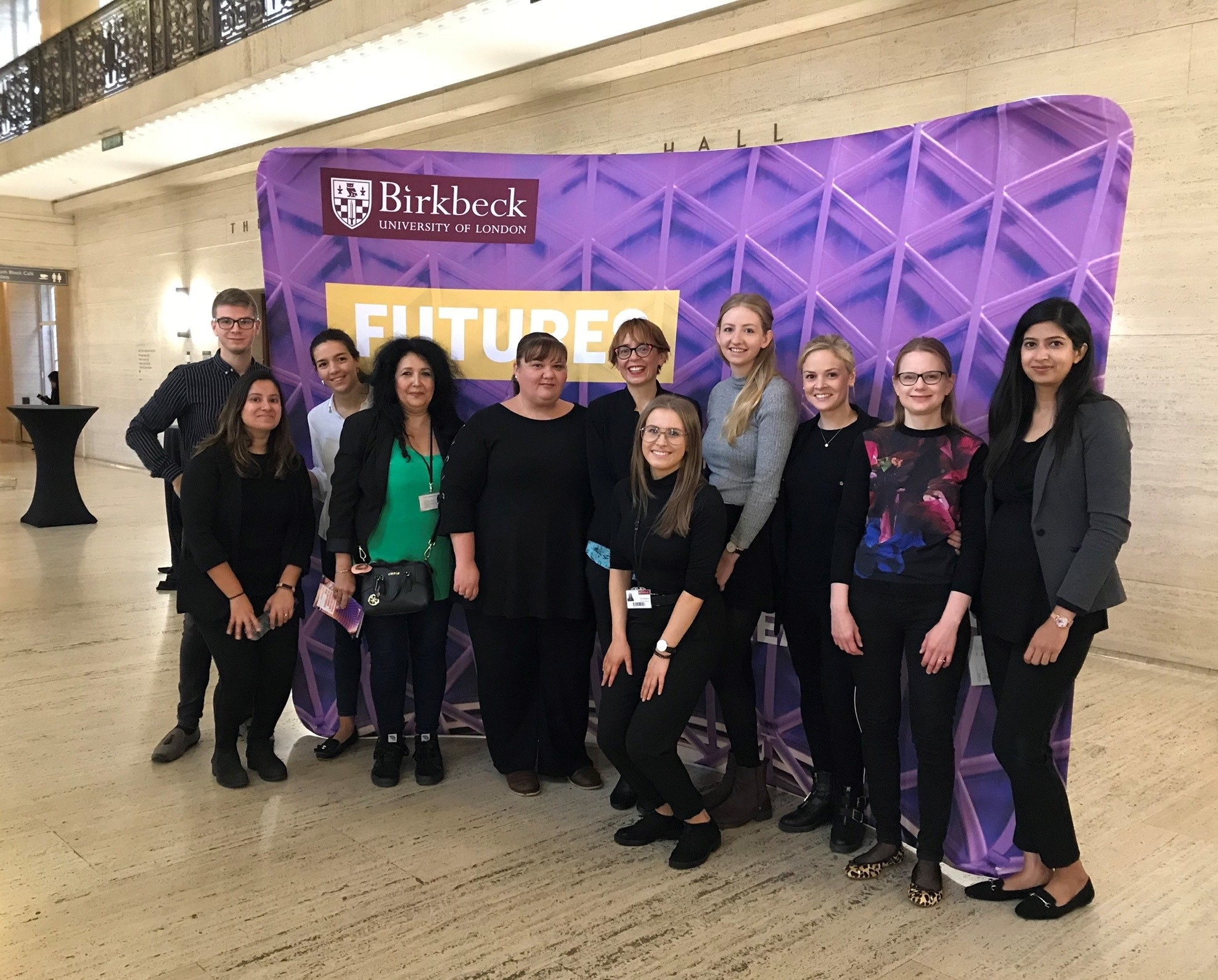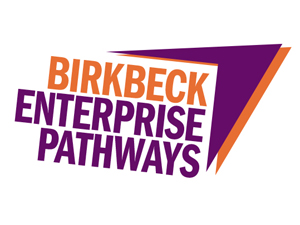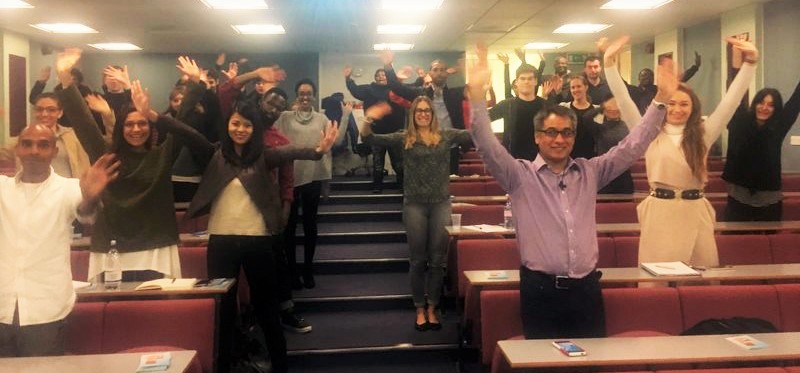Birkbeck alumna, Helen Kofler, writes about her work experience with the Birkbeck Futures team, after deciding she wanted to follow her passions and explore a career change.
As a Birkbeck masters graduate my most profound memory is of my graduation in 2015. I was sitting in the crowded auditorium and the familiar rumble of family members and friends cheering proudly for their loved ones, as they walked on stage to collect their hard-earned certificates, filled me with excitement and anticipation. I was sitting facing the stage on the right-hand side, so I saw the backs of students climbing the stage and only got to see their faces when they turned to face the audience.
One female student walked onto the stage and loud whistles and hands clapping in the sky charged throughout the audience. As I saw her turn to face me, her black gown was neatly folded around a baby carrier which she had strapped to her chest with her young toddler grinning out at the audience. For me this was everything Birkbeck stood for. The evening university which gives people the flexibility to study, whilst juggling the responsibilities of work, life and family.
So many of my contemporaries who have had children have had to turn to organisations such as ‘Pregnant, then Screwed’ when employers have discriminated against them for starting families, condemning their working lives. This woman on stage was looking that stereotype in the face and saying I am strong, I am powerful, I am intelligent and I am a mother. I was so proud to be a part of Birkbeck.
Having worked in retail in Marketing then as an Area Manager across London and the UK since 2010, I was exposed to the increasing pressure that has fallen on the UK retail market and decided it was time for me to leave the industry in search of new cheese. The only aspect of the job that I was sure I was committed to was working with, and developing, people. Through much soul searching and self-reflection I began to think about areas of my life which I enjoyed and where people were naturally drawn to me.
In the midst of this work on myself, my phone rang, “Helen, can I meet with you to help me prepare for a job interview?” “Yes!” I exclaimed. I hurriedly pored over the job spec and made a note of potential questions that could be asked. The next week, someone else called, “Helen, can we have a catch up, I am struggling at work and don’t know what my next move should be?” “Of course! Let’s go for a coffee.” This became a theme. I enjoyed so much meeting up with friends and colleagues and talking to them about career journeys but never considered it could be a full-time career itself.
Remembering my time at Birkbeck, I decided to contact the Birkbeck Futures team and ask for their advice. Even though I had graduated five years earlier, the door was flung open for me to discuss my situation with Lucy Crittenden, a Careers Consultant in the Futures team, where I was given bespoke advice and offered insight into creating a job out of my passion. An opportunity then arose for me to spend a week working alongside the team and seeing what they did on a day to day basis.
Excited and nervous, I made my way back to my old stomping ground ready for a week of learning. As I started the week, I have never come across such a generous and forward-thinking team. Spending a lot of my time with Jenna Davies, the Head of Careers, she took time out of her day to coach and mentor me. Jenna also shared her passion for entrepreneurship which I found truly inspiring and rubbed off on me giving me motivation to take side projects forward. Jenna organised a week full of interesting and fulfilling duties. These activities included research projects for Birkbeck’s inspiring Ability Programme, which is a series of lectures, workshops and networking opportunities dedicated to students and graduates with a disability, neurodivergence or long-term health conditions. I also attended training sessions and one to ones. Anna Gordon, Birkbeck Futures Career Coach helped me to reflect on my strengths and has given me a sense of purpose. Lucy Robinson, who is a Careers Consultant, gave me an insight into the Pioneer Programme, an initiative dedicated to encouraging students on their start up ideas. A week full of inspiration.
I have come away from my week at Birkbeck with that familiar sense of excitement and possibility that I was often filled with after having been to lectures and seminars as a student. Anna Gordon said that as a career changer it is important to have ‘resilience’ and I will carry this comment with me on my journey through career change. I am excited about the future and the opportunities ahead of me. I got the sense that there was a shared sense of community and purpose for each staff member that I came across. It was amazing to see as a spectator but also really infectious when surrounded by such energy.
At a lecture I attended towards the end of the week, Dr Rebecca Gumbrell-McCormick, Senior Lecturer in Management, said that Birkbeck is dedicated to inclusion and dedicated to giving people a second chance in life. The people I worked with during this week were testament to this and I am grateful to such an institution and these intrinsic values so imperative to our society today.
Further information:





 Sophie DeFries, Bio-business alumna: I obtained my BSc from St Andrews in Cell/Molecular Biology then went on to receive an MSc from London School of Hygiene and Tropical Medicine in Medical Microbiology. My post-university work experience has been in market research and consulting in the healthcare industry. I began at a market research agency in the oncology business unit solving pharmaceutical client brand strategy needs. Currently, I work for a marketing and sales management consultancy where client projects have a wide scope of therapy areas, drugs, and business objectives.
Sophie DeFries, Bio-business alumna: I obtained my BSc from St Andrews in Cell/Molecular Biology then went on to receive an MSc from London School of Hygiene and Tropical Medicine in Medical Microbiology. My post-university work experience has been in market research and consulting in the healthcare industry. I began at a market research agency in the oncology business unit solving pharmaceutical client brand strategy needs. Currently, I work for a marketing and sales management consultancy where client projects have a wide scope of therapy areas, drugs, and business objectives. Alba Ruzafa Martín, Bio-business student: I studied Biology back home in Madrid and after working in a lab for one year I decided that “lab-life” wasn’t for me. Then I decided that industry would be an interesting path to follow, so I started to look for a master’s and I found Bio-business at Birkbeck. For me, it was the perfect option. Not only because of the modules on offer but also because I needed (and still do need) to work full time.
Alba Ruzafa Martín, Bio-business student: I studied Biology back home in Madrid and after working in a lab for one year I decided that “lab-life” wasn’t for me. Then I decided that industry would be an interesting path to follow, so I started to look for a master’s and I found Bio-business at Birkbeck. For me, it was the perfect option. Not only because of the modules on offer but also because I needed (and still do need) to work full time. Igor Smyriov, Bio-business alumnus: I had been looking for a master’s degree in business with a focus on biotech and life science for more than two years before I found the MSc Bio-business at Birkbeck. It had everything I was looking for: the option to study part-time in the evening, the central London location, and a huge variety of modules to study.
Igor Smyriov, Bio-business alumnus: I had been looking for a master’s degree in business with a focus on biotech and life science for more than two years before I found the MSc Bio-business at Birkbeck. It had everything I was looking for: the option to study part-time in the evening, the central London location, and a huge variety of modules to study. Romina Durigon, Bio-business student: I was drawn to Bio-business by the desire to gain a deeper knowledge of the biotech and pharma sectors while networking and connecting with some of the most important companies and not-for-profit organisations in the UK.
Romina Durigon, Bio-business student: I was drawn to Bio-business by the desire to gain a deeper knowledge of the biotech and pharma sectors while networking and connecting with some of the most important companies and not-for-profit organisations in the UK.
 In all likelihood, it remains the role of the university to clearly articulate the known options and help students to navigate their chosen path. For this reason, Birkbeck offers unique support to students interested in developing new ideas (Enterprise), and new businesses (Entrepreneurship), in the form of
In all likelihood, it remains the role of the university to clearly articulate the known options and help students to navigate their chosen path. For this reason, Birkbeck offers unique support to students interested in developing new ideas (Enterprise), and new businesses (Entrepreneurship), in the form of 